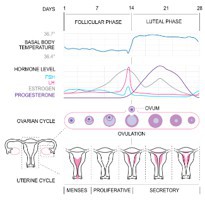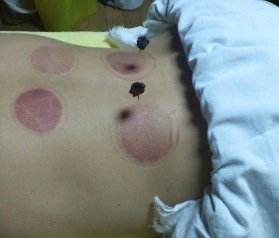Acupuncture Resolves Menstrual Cramps Regardless of Treatment Frequency and Technique

Acupuncture is used successfully to resolve a wide range of women's health issues. Menstrual issues such as dysmenorrhea (menstrual cramps) are among those issues that are treated frequently and tend to do quite well with proper treatment.
While a bit technical, our acupuncture for dysmenorrhea section, lists basic point protocols for some of the more common related Chinese diagnoses. (see treating the "cause vs. the symptoms" for general info on treating patterns in Chinese Medicine vs. conditions as in Western Medicine.)
 As one might expect in a many thousands of years old system of medicine there are a variety of approaches to the treatment of issues such as dysmenorrhea. Treatments will vary by points chosen, needling style (even needling, strong manipulation, etc.), techniques used (for example, electro-acupuncture and/or needling with moxibustion), and further variations of treatment frequency and duration of needle retention.
As one might expect in a many thousands of years old system of medicine there are a variety of approaches to the treatment of issues such as dysmenorrhea. Treatments will vary by points chosen, needling style (even needling, strong manipulation, etc.), techniques used (for example, electro-acupuncture and/or needling with moxibustion), and further variations of treatment frequency and duration of needle retention.
For the most part there are no "right" or "wrong" approaches, but ideally treatment is tailored to the individual and their specific circumstances.
Now even though there are technically no "right" or "wrong" approaches - it is a generally accepted idea that choosing the right techniques does matter as far as clinical outcomes go. Certainly what points are used will make a clinical difference. But what about how often you see the patient, or whether you use electroacupuncture or not?
To explore the outcomes of various approaches, a group of researchers from the National Institute of Complementary Medicine and the School of Nursing and Midwifery at Western Sydney University designed a study to look for differences between treatment frequency/timing with menstruation and electro vs. manual acupuncture.
Researchers recruited 74 women with dysmenorrhea and randomly divided them into 4 groups:
- Low Frequency Manual Acupuncture - treated once per week with regular body acupuncture.
- High Frequency Mannual Acupuncture - treated 3 times in the week prior to the onset of menstruation with regular body acupuncture.
- Low Frequency Electro Acupuncture - treated once per week with electroacupuncture.
- High Frequency Electro Acupuncture - treated 3 times in the week prior to the onset of menstruation with electroacupuncture.
All woman received one acupuncture treatment within 48 hours of their menses and then followed protocol depending on their grouping. Treatment was offered over 3 months (12 treatments total) and evaluated during those 3 months as well as 9 months later at the one year mark.
The treatment that was offered was tailored by the acupuncturists to their individual tcm diagnoses - for liver qi stagnation or blood deficiency as examples. But in no case were more than 7 acupuncture points used.
The researchers found that all groups received reduction in their menstrual pain with effectively nonexistent differences between the groups and these improvements were sustained at the 12 month follow up between all groups.
Those who received 3 treatments the week before menses recorded more "quality of life" improvements than the low frequency groups and both manual acupuncture groups saw less need for any analgesic usage compared with the EA groups. Of all the groups in this study, the high frequency manual acupuncture group had the strongest reduction in secondary menstrual symptoms compared with all of the other groups.
We walk away from this study with a clear understanding that acupuncture is quite effective for menstrual cramps regardless of treatment frequency or whether you use electroacupuncture or not. This is useful information, particularly in countries where acupuncture is an out of pocket expense in the sense that, as a practitioner, you should feel free to experiment with treatment frequency. Seeing how little you can treat and still get the same response. How little intervention you can do and still get the same response (or even better). Less is often more, particularly in the world of Chinese Medicine.
tag @yinyanghouse for questions/comments